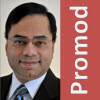 by Promod Sharma, President 2011-2012
by Promod Sharma, President 2011-2012We see as we are.
In Toastmasters, we improve our skills by observing others. As you listen to a speaker, you form your own impressions. When you hear the Evaluator, you often get different perspectives. That's valuable.

What if you good listen to different evaluations of the same speaker? In a recent Speech Evaluation Contest, five contestants evaluated the same guest speaker.
For Example
While there was overlap, each Evaluator had different perspectives. They commented on such elements as- the importance of pausing
- the challenges of speaking to a new audience
- the effective use of hand gestures to show how a cantilever works
- the size of the props used
- the intricate design of the content
- the vocal variety in the delivery
- the multiple meanings of the title
Movies
Do you read movie reviews? If you've seen the film, you might wonder if the reviewers saw the same film. A speech evaluation is like a 2-3 minute movie review.Ultimately, an evaluation is an opinion and opinions vary. You need not agree to become a better speaker or Evaluator. You just need to listen and watch. It's best if you form your own opinions before the Evaluator speaks. Even if you disagree, you learn by seeing how others interpret the same event.
Later
There's pressure on contestants in a Speech Evaluation Contest, but not for you in the audience. You can silently pretend that you're an Evaluator without competing.As you build your powers of observation, you'll find yourself using them regularly without noticing. You'll find that even professional speakers can improve.
Links
- Control the fear of public speaking
- Get feedback from the right group
- Three mistakes seminar speakers make
- Prepare your speech with a mindmap
- Lessons from one year in Toastmasters
- image courtesy of Tom Oliveira (US)
You'll find more about Promod than you'd ever want to know at promodsharma.com. He's speaking about trust at Freelancecamp Toronto on March 25, 2012.

No comments:
Post a Comment